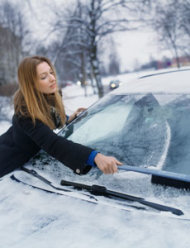Old habits die hard, and one of the oldest-still rigorously enforced by many drivers-is that "warming up" the car for a few minutes is necessary to avoid some kind of unspecified damage.
But idling is totally unnecessary, which is why many communities have enacted ordinances against the practice. Don't take my word about idling being ineffective, but do listen to my mechanic, Rob Maier, who runs Maier's Garage in Bridgeport, Connecticut. He says, "You don't really need to idle your car, because of the efficiency of modern fuel injection, which eliminated carburetors and chokes. The only reason to let the car idle at all is to get the oil circulating, but after 30 seconds that's a done deal. My truck has 150,000 miles on it, and I just throw it into gear and go."
Here are some quick facts and tips that should put the idling question to rest:
1. Driving Warms the Car Faster than Idling.
If your concern is not the health of the car, but simply your own creature comforts, energy experty Bob Aldrich points out that "idling is not actually an effective way to warm up a car - it warms up faster if you just drive it." The coming electric cars, such as the Nissan Leaf, will incorporate a wonderful feature that allows the owner to use a cellphone to tell the car (which is plugged into the grid) to pre-warm or pre-cool the interior. No idling necessary.
2. Ten Seconds Is All You Need.
The Environmental Defense Fund, which produced the Idling Gets You Nowhere campaign, advises motorists to turn off their ignition if they're sitting stopped for more than 10 seconds. "After about ten seconds, you waste more money running the engine than restarting it, said Andy Darrell, deputy director of the EDF Energy Program. "Switch the car off at the curb and you'll be leaving money in your wallet and protecting the air in your community."
3. Idling Hurts the Car.According to the Hinkle Charitable Foundation's
Anti-Idling Primer, idling forces an engine "to operate in a very inefficient and gasoline-rich mode that, over time, can degrade the engine's performance and reduce mileage."
4. Idling Costs Money.
Over a year of five minutes of daily idling (which causes incomplete combustion of fuel), the "Anti-Idling Primer" estimates that the operator of a V-8-engined car will waste 20 gallons of gasoline, which not only produces 440 pounds of carbon dioxide but costs at least $60.
5. Idling in the Garage Can Kill You.
Idling a car in a garage, even with the door open, is dangerous and exposes the driver to carbon monoxide and other noxious gases. If the garage is attached, those fumes can also enter the house.
6. Block Heaters Beat Remote Starters.Lori Strothard of the
Waterloo Citizens Vehicle Idling Reduction Task Force says, "Remote starters can too easily cause people to warm up their cars for five to 15 minutes, which is generally unnecessary. A block heater, which is designed to heat the engine and can cost under $30, on a timer set to start one to two hours before driving does the trick in very cold climates.
7. Quick Errands Aren't Quick Enough.Natural Resources Canada points out that
"quick errand" idling is another way to waste gas and pollute both your town and the planet. "Leaving your engine running is hard on your pocketbook, produces greenhouse gas emissions and is an invitation to car thieves," the agency says.
8. Idling is Bad for Your Health (and Your Neighbor's Health).
According to Minneapolis' anti-idling ordinance, "Exhaust is hazardous to human health, especially children's; studies have linked air pollution to increased rates of cancer, heart and lung disease, asthma and allergies." Isabelle Silverman, who runs EDF's anti-idling campaign, says that car idling "is the second-hand smoking of the outdoors. One of the problems is that cars idle close to the curb, where pedestrians are walking. And when you have a child in a stroller, they are particularly close to the tailpipe. Studies show that children's IQ levels are lower when they live near major roads with lots of traffic."
Alex Scaperotta, who created an anti-idling campaign with a classmate when he was in fifth grade in Wilton, Connecticut, came up with a slogan that was used on bumper stickers and websites: "If you're stopped for more than 10, turn it off and on again." Sounds like good advice.




